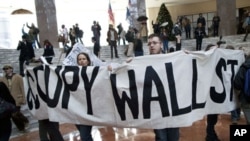The growing income gap between rich and poor is one of the reasons that activists from the Occupy Wall Street movement staged protests in New York, across the United States and in other nations in 2011.
Major studies leave no doubt that the income gap is growing, but there is an even wider gulf in opinions about what, if anything, to do about it.
Activists in hundreds of cities protested economic inequality and unemployment.
They say troubled banks get bailed out by taxpayers, but ordinary people with financial problems face foreclosure.
The Occupy movement blames the financial crisis on banks and Wall Street, and says the wealthiest one percent of the population gets too much money and takes advantage of the 99 percent, buying political power to block taxes on the rich and slash social services for the poor.
It is demanding a more equitable society through more taxes on the wealthy and more regulation of business.
But Peter Wallison of the American Enterprise Institute says lower taxes and less business regulation would help the economy.
He says the growth of high tech firms like Apple computer show government should get out of the way of entrepreneurs like Steve Jobs.
Wallison says income inequality is less important than the possibility of getting rich, which drives entrepreneurs to take risks and create products.
"Many of these people grew up in very poor circumstances [Apple computer co-founder] Steve Jobs was a great example of that, and turned out to be a very wealthy man because of the things he was able to do in our very flexible society," says Wallison.
But John Cavanagh of the Institute for Policy Studies says high unemployment raises doubts about the rags to riches story.
"I think why the Occupy movement has struck such a cord, and been so popular, that they are the living embodiment that that story is no longer true," Cavanagh says.
The Congressional Budget Office says the richest one percent of the U.S. population saw its income jump 275 percent over the past three decades, while the poorest one-fifth gained just 18 percent.
The Organization for Economic Cooperation and Development shows the wealthiest one-tenth of U.S. society has an income 14 times the size of that of the poorest one-tenth.
OECD Secretary-General Angel Gurria says inequality is a problem.
"The social compact is starting to unravel in many countries. Uncertainty and fears of social decline and exclusion have reached the middle class in many societies. People feel that they are bearing the brunt of a crisis for which they have no responsibility, while those on high incomes appear to have been spared."
The protesters say they will continue as long as the economic problems that sparked the demonstrations, such as unemployment, remain unsolved.












